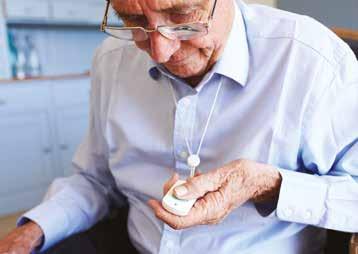Helping you to stay independent Services developed in partnership with the voluntary sector Adult Social Care works with voluntary and community organisations to supply preventative care services. These are a vital form of support and help to maintain independence and social inclusion, and delay or avoid the need for more statutory interventions.
• day services, lunch clubs and social groups;
Examples include:
• handyperson schemes.
• befriending, visiting and telephone contact services; • support schemes to help people being discharged from hospital; • support for carers; and
Day care centres Many people can feel lonely or isolated without an opportunity to fill their days with meaningful activities. Research has shown that one way to alleviate loneliness and promote wellbeing and independence is to provide regular social contact and a focus for activities. Day care centres give people the chance to change their routine, meet new people, take up an activity
or receive specialist services such as chiropody or hairdressing. There is a wide variety around the county, catering for older people, people with mental health conditions, learning disabilities and dementia. Centres can be as important for carers as those attending as they allow for a regular break from caring. Visit www.warwickshire.gov.uk/daycentres for information about opportunities in Warwickshire.
Meals on wheels Some services can deliver frozen or freshly cooked meals to your home. Frozen meals can be delivered in bulk and kept in your freezer until required, while hot meals should be eaten immediately. Councils may be able to arrange meals delivered to your door, though you would have to meet their eligibility criteria and it may not be free.
National and local commercial organisations can also provide meals delivered to your door at a charge. You may find a service by word of mouth or using the internet – your local library may be able to help here – see page 62 for contact details. Alternatively, your local authority may have details on their website. Contact details are on page 5.
Adapting your home To remain in your own home for as long as you would like, you should ensure that it is safe, secure and warm. Some forward planning to ensure that the garden doesn’t become a burden is also sensible. If you are not planning to move, think about adaptations that would make life easier now and later on. Home Improvement Agencies (HIAs) HIAs are local organisations funded and supported
6
by local and central Government. They work professionally and sensitively with older and disabled homeowners, providing advice, support and assistance to help them repair, improve, maintain or adapt their homes to meet their changing needs. Most HIAs provide three main services, including: information and advice on repairs or adaptations you may be considering – this usually entails a visit to your home and is often free; a handyperson
Se a rch f or ca r e a t www. ca re c h o i c e s .c o .u k t o fi n d s u p p o r t i n y o u r are a













